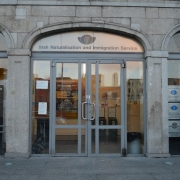On 23rd December 2020 the ISD published the Minister’s new scheme in relation to Non-EEA Family Members of UK Citizens intending to reside in the State from 1st January 2021 onwards.
The rights of British citizens to reside in Ireland remains unchanged. The rights of family reunification with Non-EEA family members has now changed dramatically.
British citizens who exercised their rights of free movement to Ireland prior to 31.12.20 will continue to hold rights to family reunion equivalent to those provided for by Directive 2004/28/EC and the European Communities (Free Movement of Persons) Regulations 2015.
British citizens who have moved to reside and work in Ireland and who wish to be joined by their Non-EEA family members from 1st January 2021 onwards will have their family members applications considered and assessed under this newly published scheme.
A key point to note is that all applications are to be made from outside of the State regardless of an applicant’s nationality. This is a fundamental difference to applications from family members of Irish and other Non-EEA family members- applicants from “visa required” countries apply for visas whilst remaining outside the State, applicants from “non visa required” countries can travel to the State and make their application for entry at the airport. For non-EEA family members of British citizens, a visa application must be made for visa required nationals and a preclearance application is to be made for non-visa required applicants.
The policy specifically confirms that an applicant currently in the State on visitor permission cannot apply from inside the State for a change to a long-term permission.
Where a non-EEA national holds a separate immigration permission within the State for the purpose of study, work, etc., and subsequently becomes the spouse/civil partner/ de facto partner of a British citizen, a change of status request may be made.
The INIS Policy on Non-EEA Family reunification, last updated in December 2016 continues to apply to the non-EEA family members of Irish citizens and legally resident Non-EEA nationals.
This new policy specifically relates to non-EEA family members of British citizens.
There are no minimum Irish residency requirements for UK citizens seeking to sponsor a specified non-EEA national family member.
Financial thresholds:
For all categories of applications:
In order to sponsor a specified non-EEA national family member, a UK citizen must not have been totally or predominantly reliant on social protection benefits in the State or to equivalent benefits in another State for a continuous period of at least 2 years prior to the application.
Applications involving spouses/ partners only:
The WFP does not apply in the case of a married couple, civil partner / de facto partnership where there are no children and consequently a minimum level of assessable income for couples without children is €20,000 per annum, over and above any entitlement to State benefits.
Applications involving minor children/ dependent children up to the age of 22 of British citizen or partner/spouse of British citizen:
In addition, the sponsor must have earned a gross income in each of the 3 previous years in excess of that applied by the Department of Social Protection (DSP) in assessing eligibility for Working Family Payment (WFP).
4.6 A sponsor who wishes to reside with their dependent children in the State requires the net assessable income per week for their family size as set out by the Department of Social Protection (DSP) in assessing eligibility for the Working Family Payment, as published on that Department’s website. The sponsor should comply with those limits including with respect to any changes to the WFP as published at (http://www.welfare.ie/en/Pages/Working-Family-Payment-Op.aspx.)
Applications for dependent parents (aged 66 and over)
A sponsor will be required to have earned in each of the 3 years preceding the application, an income after tax and deductions of not less that €60,000 per annum in the case of one parent. €75,000 per annum applies where two parents are involved.
The expectation is that this minimum level of income will be maintained for the duration of any permission granted under this Scheme. Where such income levels are not maintained, permission may not be renewed under the Scheme. At the date of application, the sponsor is also required to show that he/she is capable of earning a sufficient level of income to support his/her dependent family members for the duration of their proposed residence in the State.
Eligible applicants
British citizens moving to Ireland from 1.1.21 onwards no longer have the legal entitlement to apply for entry and residence for their wider dependent Non-EEA family members and members of their households. Eligible family members are specifically listed under the Scheme and the immigration stamp to be granted to the applicant if successful are also outlined:
- Spouse, (Stamp 4D)
- civil partner, (Stamp 4D)
- de factor partner (2 years cohabitation required), (Stamp 4D)
- minor children, (Stamp 3 up to age of 18, Stamp 4D at age of 18 “upon application”).
- children between the ages of 18 and 22 in certain circumstances of dependency (also applies to the children of the spouse/ civil partner and de facto partner of British citizen) (Stamp 4D)
- elderly dependent parents of British citizen or spouse/partner of British citizen (must be 66 years of age of older), (Stamp 0).
The policy is silent on the conditions of Stamp 4D permission and the INIS webpage has not yet been updated to outline the conditions of Stamp 4D permission and any material differences between Stamp 4D and Stamp 4.
Other additional requirements:
There are also additional requirements, not required under the 2016 INIS family reunification policy document, namely the requirement for the applicants to have health insurance in place to commence from the date of entry to the State and the requirement to provide a police clearance certificate for any country resided in for in excess of 6 months over the previous 5 years.
Fees are payable in respect of applications under this scheme, €60 per visa/ pre clearance application and the registration fees of €300 will be applied to successful applicants.
Full details on the scheme can be found via the below:
http://www.inis.gov.ie/en/INIS/policy-document-brexit-scheme-non-eea-family-british-citizens-seeking-immigration-permission.pdf/Files/policy-document-brexit-scheme-non-eea-family-british-citizens-seeking-immigration-permission.pdf
http://www.inis.gov.ie/en/INIS/Pages/joining-your-uk-national-family-member-in-ireland
Please get in contact if you or your family are impacted by this new scheme.






